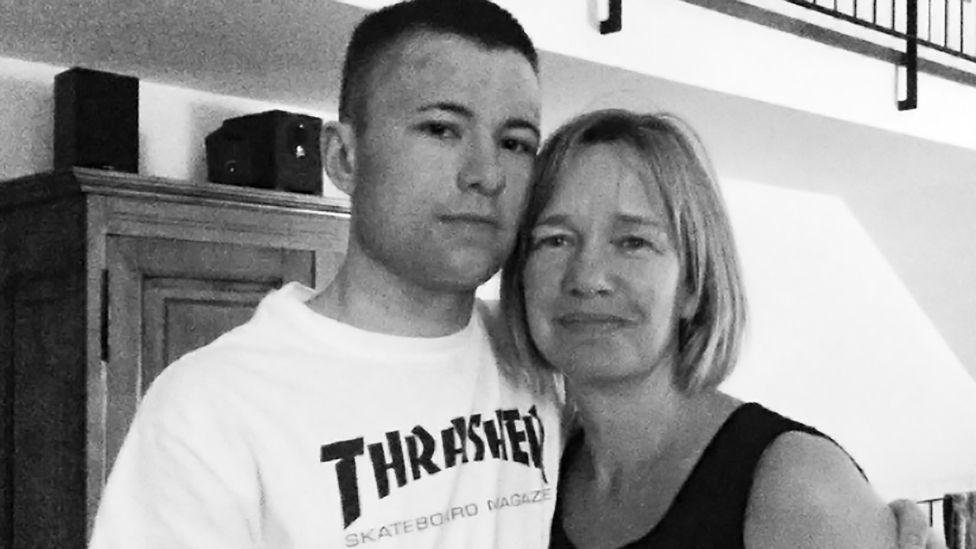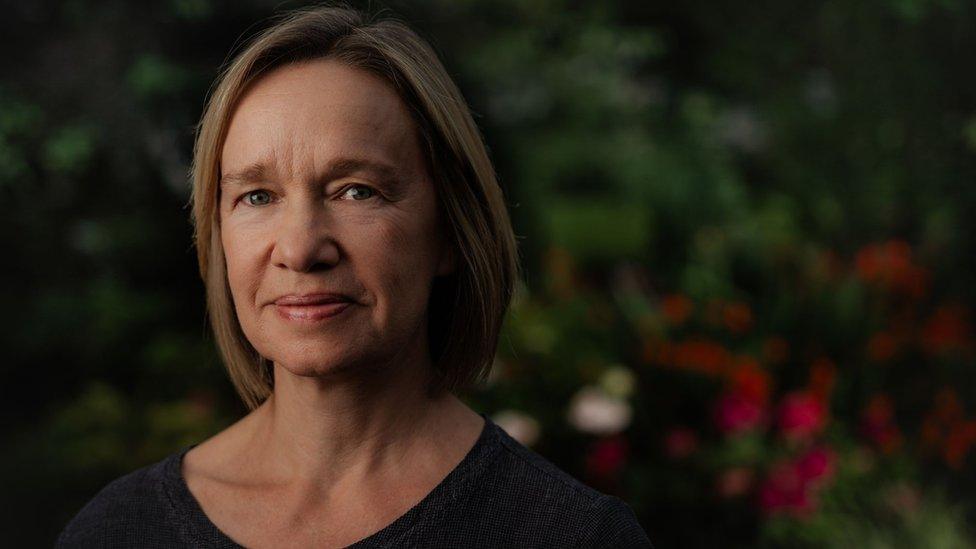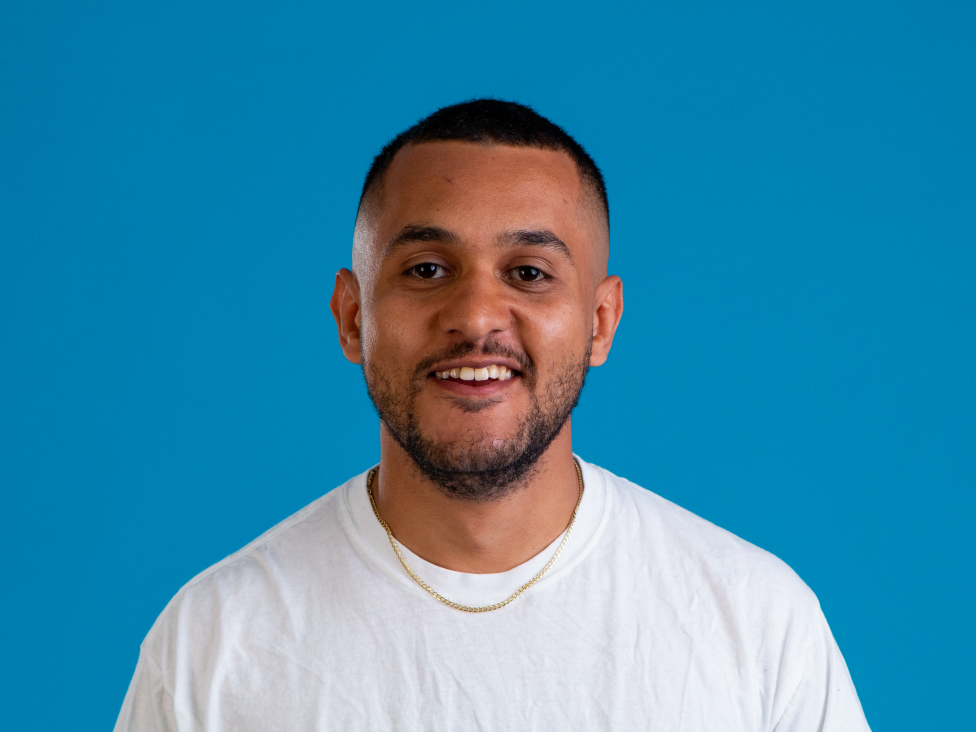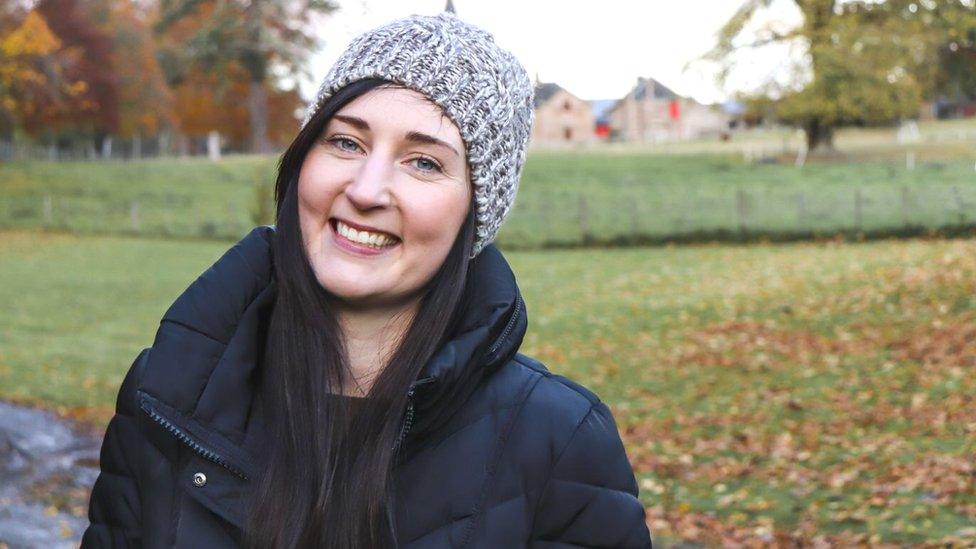Antidepressants: I wasn't told about the side effects
- Published
Seonaid Stallan says Dylan had expressed no suicidal thoughts before starting on Sertraline
About one in seven people in the UK now take medication to treat depression but some say they are not being given appropriate advice about the potential side effects of the drugs they have been prescribed.
Seonaid Stallan's son Dylan was a teenager when he began receiving treatment for body dysmorphia and depression.
"He was struggling with the way he felt about himself, the way he looked," Seonaid said.
"He was extremely anxious. He would be physically sick. He would be unable to leave the house."
Dylan, from Glasgow, was treated with the antidepressant Fluoxetine from the age of 16.
But when he turned 18, his medication was changed to Sertraline.
Within two months of his prescription change he had taken his own life.

Dylan Stallan's mother Seonaid says they were not warned about potential side effects when his antidepressant was changed
His mother says neither of them were warned about potential side effects when his medication was changed.
Seonaid says she was at the appointment with her son and they were not told he might feel worse on the new drug before he felt better.
She says he was also told that it would be okay to drink alcohol while on the new antidepressant.
NHS guidance says it is best to avoid alcohol when starting on Sertraline until you see how it makes you feel - and the leaflet inside the box itself says alcohol should be avoided.
Seonaid says the night before her son took his own life in 2015, he had drunk a "considerable amount" of alcohol.
She says Dylan had expressed no suicidal thoughts before starting on Sertraline.
Seonaid says "none of us can say for sure what would have happened" had she and Dylan been told about the possible effects of drinking alcohol.
But she believes the advice they received from the clinic played a role in her son's decision to end his life.

Seonaid Stallan says Dylan had expressed no suicidal thoughts before starting on Sertraline
The private clinic where Dylan was treated told the BBC it was "deeply saddened" by his death and extended its condolences to his family.
"Though we are not in a position to comment on any individual's treatment, our clinical team would of course be happy to meet with Ms Stallan if there remain concerns she would like to discuss," it said.
The effectiveness of antidepressants on under-18s is not fully known and in the UK only one kind of drug - Fluoxetine, also called Prozac - is commonly prescribed to this group.
But, when you turn 18, like Dylan, you can be prescribed any antidepressant.
There is some clinical trial evidence to suggest the risk of suicide in 18 to 24-year-olds is increased when they take these medications.
Better understanding
Prof Bernadka Dubicka says a discussion around side effects should be happening whenever a patient is prescribed antidepressants, regardless of age.
She told the BBC: "The data seems to show that up until the age of 25, one in 50 young people who are on an antidepressant might experience an increase in suicidal thinking and self-harm in those first few weeks after taking an antidepressant."
Seonaid believes better research and a better understanding of the side effects of antidepressants may be life-saving, as rates of prescriptions go up.
She told Dylan's story to a new documentary for the BBC iPlayer which features the stories of young people whose lives have been changed - and saved - by antidepressants.
Wider discussion of side effects when taking these drugs has grown as numbers of those prescribed the drugs have risen.
About one in seven people in the UK now take antidepressants and about 8% of those are under 25.
The physical and mental side effects of the drugs can be wide-ranging from headaches and brain fog to more severe side effects such as loss of sexual function and suicidal thoughts.
Experts say there is not always time for these side effects to be fully discussed at the point the drugs are prescribed.
GP and sexual medicine expert Dr Ben Davis believes the current pressures on GPs mean in-depth discussion of the effects of the drugs does not always happen.
He said: "There are people for whom they are life-saving medication.
"But the other side is a 10-minute consultation with someone you've never met before, with the pressure of someone who is seeing 30 people a day.
"Do good decisions about long term medication happen in that environment? I think not."
The BBC has spoken to more than 100 people who have used or are using antidepressants, and all of them report side effects of some kind.

Connor spoke to us under a pseudonym to shield his identity
For some it has had a profound and negative impact on their sex lives.
Connor, who spoke to us under a pseudonym to shield his identity, has described the impact that antidepressants have had on his body.
He suffers from what is known as PSSD, or Post-SSRI Sexual Dysfunction.
An SSRI is a class of antidepressant that includes Sertraline, which Connor began taking in his 30s.
He says that within 24 hours of his first pill, his sex drive disappeared, which was accompanied by extreme physical symptoms.
No attraction
Twelve months after stopping taking antidepressants, these symptoms persist.
"I still have numbness in my genitals," he says. "I'm basically asexual. I have no attraction to the opposite sex.
"When I considered myself to be a depressed person, I had a very healthy sex life."
Connor is one of more than 1,000 people who are part of the PSSD Network, an online community started to raise awareness of the condition, which is not currently recognised by the NHS.
He says antidepressants have "completely destroyed [his] life".
Dr Davis says sexual difficulties on antidepressants are prevalent.
"We know that one in two people with depression will have some difficulty with sex," he said.
"But we also know if you give medication to people, if you give antidepressants, there is evidence that up to eight in 10 people suffer from sexual difficulties with medication."
But for some, the risk of side effects is worth the positive impact that antidepressants can have.

Elliott Brown says antidepressants have saved his life
London-based comedian Elliott Brown has been taking antidepressants on-and-off since the age of 16.
One side effect has been a reduction in his libido.
"In terms of sex drive, it's a lot higher when I'm off them," he said.
"Your partner who you're with sometimes, their thought is, 'is it because I don't find them attractive enough'?
"That's the point where you have to be honest with them."
He says, regardless of side effects he experiences, the trade-off has been worth it and they have saved his life.
"I don't think I'd be here without them," Elliott says.
"I think it's more important to want to be here and be with your loved ones than get lucky occasionally, or, for me, very rarely."
You can watch Are My Antidepressants Worth It? on the BBC iPlayer.
If you or someone you know are feeling emotionally distressed, the BBC Action Line can point you to organisations that offer advice and support.

How did taking antidepressants affect you? What were the side effects like? You can get in touch by emailing haveyoursay@bbc.co.uk, external.
Please include a contact number if you are willing to speak to a BBC journalist. You can also get in touch in the following ways:
WhatsApp: +44 7756 165803
Tweet: @BBC_HaveYourSay, external
Please read our terms & conditions and privacy policy
If you are reading this page and can't see the form you will need to visit the mobile version of the BBC website to submit your question or comment or you can email us at HaveYourSay@bbc.co.uk, external. Please include your name, age and location with any submission.
Related topics
- Published5 February 2018

- Published29 July 2023
